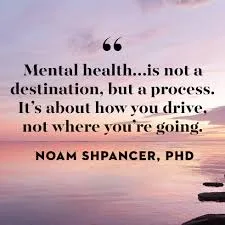Self-Care and Mental Health Quotes to Encourage Compassion
Caring for your mind and body begins with simple acts of kindness—sometimes, the right words can make all the difference. That’s why self-care and mental health quotes are powerful tools: they remind us to nurture our well-being, inspire resilience, and encourage compassion toward ourselves and others. In this article, you’ll discover how thoughtfully chosen quotes can uplift your mood, spark healing, and motivate you to make self-care an essential part of daily life.
Self-care and compassion go hand-in-hand with mental health, forming the foundation for personal healing, resilience, and genuine kindness toward others. By turning to inspiring quotes from respected thinkers and therapists, we can find new motivation to cultivate self-acceptance, practice self-kindness, and deepen our empathy for the world around us.
The Power of Self-Compassion
Compassion is most transformative when it begins with ourselves. Jack Kornfield reminds us, “If your compassion does not include yourself, it is incomplete”. Kristin Neff emphasizes this theme: “Self-compassion is simply giving the same kindness to ourselves that we would give to others”.
Brené Brown says, “Self-awareness and self-love matter. Who we are is how we lead.” This underscores that the quality of our relationships and contributions to others depend on how we treat our own heart.
Mental Health Quotes that Encourage Kindness

Mental health quotes illustrate how gentle, nonjudgmental self-care leads to emotional resilience and stronger connections. Notable lines include:
- “Acknowledge, accept, and honor that you deserve your own deepest compassion and love.” – Nanette Mathews
- “The only person who can pull me down is myself and I am not going to let myself pull me down anymore.” – C. Joybell C.
- “How we care for ourselves gives our brain messages that shape our self-worth. So we must care for ourselves in every way, every day.” – Sam Owen
- “For those of you who struggle with guilt regarding self-care, answer this question: What greater gift can you give to those you love than your own wholeness?” – Shannon Tanner
Expanding Kindness in Mental Health
Kindness is a cornerstone of mental health, acting as both a gentle balm for personal struggles and a bridge to greater community connection. When we weave kindness into our thoughts, words, and actions, we reinforce the idea that healing and growth are supported not just by treatment, but by care and mutual respect. Studies show that even small acts of kindness—like a warm smile or a caring word—can promote resilience, buffer stress, and uplift both giver and receiver.
Quotes such as “Compassion links us to others. We share a common humanity with a common wish to be happy, free from suffering and to live with grace,” reinforce the transformative power of kindness in mental health, reminding us that every act of understanding has the potential to spark lasting change.
Self-Care in Practice
Practicing self-care means listening to your physical, mental, and emotional needs. This process may include setting boundaries, engaging in joyful activities, or giving yourself permission to rest. Mandy Hale encourages: “It’s not selfish to love yourself, take care of yourself, and to make your happiness a priority. It’s necessary”.
Thich Nhat Hanh uses a gentle metaphor: “Your pain, your anxiety is your baby. You have to take care of it. You have to go back to yourself, to recognize the suffering in you, embrace the suffering, and you get relief”.
Self-Care Quotes: Nourishing Yourself First
Self-care quotes emphasize the importance of making your well-being a priority—not as an act of selfishness, but as the foundation for thriving physically, emotionally, and spiritually. As Audre Lorde reminds us, “Caring for myself is not self-indulgence, it is self-preservation, and that is an act of political warfare,” asserting that personal wellness is a form of resistance and empowerment.
Mandy Hale echoes this theme: “It’s not selfish to love yourself, take care of yourself, and to make your happiness a priority. It’s necessary,” dismantling the cultural notion that self-care is a luxury rather than a vital need. These quotes encourage us to listen to our bodies, set boundaries, and make choices that restore joy and balance, preparing us to better support others with genuine kindness.
Ways to Incorporate Self-care Quotes into a Wellness Routine
Here are effective ways to incorporate self-care quotes into a wellness routine for daily encouragement and motivation:
Ways to Use Self-Care Quotes
- Place favorite self-care quotes on sticky notes around your workspace, mirror, or fridge to create visual reminders of your commitment to self-kindness.
- Use a self-care quote as a daily mantra during meditation or mindfulness practice, helping to set a positive, nurturing intention for your day.
- Start a self-care journal with a new quote each week; reflect on how it applies to your life and jot down small steps taken toward wellness.
- Integrate self-care quotes into your digital routine by making them your phone wallpaper, setting reminders, or sharing on social media to inspire both yourself and others.
- Read a self-care quote to begin group wellness activities, using it to set the tone for discussions, yoga sessions, or support-group meetings.
- Pair self-care quotes with breathwork or light stretching during breaks to reinforce the mind-body connection and refresh yourself mentally.
Regular exposure to positive self-care quotes helps reinforce healthy habits, shift your mindset, and cultivate lasting resilience over time.

Morning Self-Care Meditation With Affirmations
Begin your day by setting a compassionate tone and nourishing your well-being through this short, intentional self-care meditation:
1. Find Stillness and Breathe
Sit comfortably and close your eyes. Take a few slow, deep breaths, allowing each exhale to release tension and bring presence into the morning.
2. Heart Connection
Place a hand gently on your heart. Feel its steady beat, offering silent gratitude for your body’s wisdom and resilience.
3. Repeat Self-Care Affirmations
Silently or softly say each affirmation three times, letting the words settle in:
- “I am worthy of compassion today.”
- “I embrace my humanity, imperfections and all.”
- “I am enough.”
- “I honor my boundaries and treat myself with kindness.”
- “I am strong and resilient.”
- “Today, I’ll speak to myself as I would to a good friend.”
- “I allow myself space for rest and renewal.”
4. Mindful Body Scan
Notice your entire body from head to toe, sending breath and kindness to any areas of tension or discomfort, acknowledging your needs without judgment.
5. Set a Positive Intention
Before ending your meditation, affirm: “Today, my acts of self-care will nourish my body, mind, and heart.” Visualize moving through your morning with gentle confidence and self-respect.
Open your eyes, take a deep breath in, and step into the day rooted in kindness towards yourself.
Compassion’s Ripple Effect
Self-care and self-compassion are not isolated acts; they enable us to show up for others in full presence and warmth. Pema Chodron reflects: “Compassion for others begins with kindness to ourselves”. Marianne Williamson adds: “Compassion links us to others. We share a common humanity with a common wish to be happy, free from suffering and to live with grace”.
Famous Self-compassion Quotes and Their Meanings
Here are some famous self-compassion quotes and the deeper meanings behind each, highlighting why these words resonate for personal growth and well-being:
1. “If your compassion does not include yourself, it is incomplete.” – Jack Kornfield
This quote reminds us that kindness shown only to others, without offering the same care inwardly, diminishes the power and wholeness of compassion. True compassion must begin with the self to bloom outward.
2. “Talk to yourself as you would someone you love.” – Brené Brown
Often, people are harshest to themselves. This quote encourages us to shift our inner dialogue—replacing criticism with understanding and patience, as we would with a dear friend.
3. “Self-compassion is simply giving the same kindness to ourselves that we would give to others.” – Christopher Germer
Germer highlights that self-compassion is about extending to ourselves the understanding we naturally offer to others, breaking patterns of self-blame and harshness.
4. “Self-awareness and self-love matter. Who we are is how we lead.” – Brené Brown
Brown ties leadership and influence to self-acceptance, reminding us that our capacity to help others is rooted in how we treat and view ourselves.
5. “The only person who can pull me down is myself and I’m not going to let myself pull me down anymore.” – C. Joybell C.
This quote empowers us to take responsibility for our self-talk and well-being, suggesting that building ourselves up is both possible and liberating.
6. “Whatever you do, be gentle with yourself.” – Sanoben Khan
Gentleness with oneself is key for enduring growth, healing, and change—this quote is a gentle prompt to treat yourself with patience at all times.
7. “A moment of self-compassion can change your entire day. A string of such moments can change the course of your life.” – Christopher Germer
Germer points out how single acts of self-compassion can transform mood and, when practiced often, can lead to lasting positive change.
8. “Having compassion starts and ends with having compassion for all those unwanted parts of ourselves.” – Pema Chodron
This reminds us to make room for all aspects of who we are—flaws and all—knowing that true healing comes from acceptance, not rejection, of every part of ourselves.
How Self-compassion Improves Mental Health and Resilience
Self-compassion significantly improves mental health and strengthens resilience by fostering a kinder, more balanced relationship with oneself in times of difficulty. When practiced regularly, self-compassion reduces anxiety, depression, and stress by countering negative self-talk and self-criticism, creating a nurturing internal environment.
Mental Health Benefits
- Practicing self-compassion leads to better emotion regulation, less rumination, and a decrease in symptoms of anxiety and depression, as it encourages individuals to approach their struggles with understanding rather than harsh judgment.
- It helps activate neural pathways associated with calmness and emotional regulation, making stressful experiences less overwhelming.
- Studies have shown self-compassion is a protective factor, reducing psychological distress and burnout, especially in demanding situations.
Building Emotional Resilience
- Self-compassion equips people to better cope with setbacks and adversity, viewing failures as part of a shared human experience instead of personal shortcomings.
- It enhances adaptability to change and boosts recovery from emotional challenges, allowing for a more optimistic approach to life’s difficulties.
- The mindset shift toward empathy for oneself leads to faster emotional recovery and greater stability over time.
Practical Ways It Helps

- Self-compassionate individuals are more likely to engage in healthy coping strategies, like self-care, mindfulness, and seeking support, instead of harmful behaviors.
- By accepting and embracing their imperfections, people can build long-term mental well-being and emotional strength.
Incorporating self-compassion not only relieves immediate mental health struggles but also rewires the brain for adaptive, resilient responses to future stress.
Final Thoughts
Cultivating self-care through compassionate mental health practices isn’t just a personal luxury—it benefits everyone we touch. By incorporating these inspiring quotes into your daily routine, you can foster gentler self-talk, repair emotional wounds, and deepen empathy for yourself and the wider world.
FAQ: Self-Care and Mental Health Quotes to Encourage Compassion
Self-care includes regular activities and habits designed to reduce stress, nurture well-being, and prevent burnout. Prioritizing self-care is vital because it helps improve mood, lowers anxiety, and supports both physical and mental health.
Self-care and mental health quotes can act as daily reminders, positive affirmations, and sources of inspiration. They encourage compassion and self-kindness, helping to shift your mindset and provide motivation when you need it most.
No, quotes support self-reflection and encouragement, but they aren’t substitutes for professional help. Therapy provides personalized mental health care from licensed professionals, which is essential for deeper emotional challenges.
Regular exposure is best. Making quotes a daily or weekly part of your routine—through journals, morning rituals, or phone reminders—reinforces positive thinking and self-compassion over time.
Most people find encouragement and comfort in self-care quotes, but individuals respond differently. Try placing quotes where you’ll see them, using them in meditations, or sharing with friends to find the practices that support you best.




